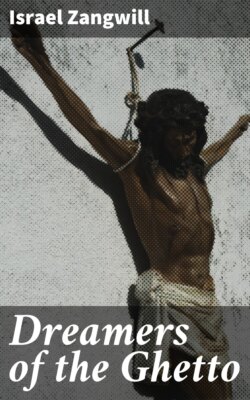Читать книгу Dreamers of the Ghetto - Israel Zangwill - Страница 36
На сайте Литреса книга снята с продажи.
XI
ОглавлениеAnd the more he pondered upon this resolution, after Dom Diego had indignantly shaken off the dust of his threshold, the more he was confirmed in it. To outwit the Jewry would be the bitterest revenge, to pay lip-service to its ideals and laugh at it in his sleeve. And thus, too, he would circumvent its dreaded design to seize upon his property. Deception? Ay, but the fault was theirs who drove him to it, leaving him only a leper's life. In the Peninsula they had dissembled among Christians; he would dissemble among Jews, aping the ancient apes. He foresaw no difficulty in the recantation. And—famous idea!—his brother Joseph, poor, dear fool, should bring it about under the illusion that he was the instrument of Providence: for to employ Dom Diego as go-between were to risk the scenting of his real motive. Then, when the Synagogue had taken him to its sanctimonious arms, Ianthe—overwhelming thought!—would become his wife. He had little doubt of that; her farewell glance, after her father's back was turned, was sweet with promises and beseechments, and a brief note from her early the next morning dissipated his last doubts.
"My poor Senhor Da Costa," she wrote, "I have lain awake all night thinking of thee. Why ruin thy life for a mere abstraction? Canst thou not make peace!—Thy friend, Ianthe."
He kissed the note; then, his wits abnormally sharpened, he set to work to devise how to meet his brother, and even as he was meditating how to trick him, his heart was full of affection for his little Vidal. Poor Vidal! How he must have suffered to lose his beautiful wife!
There were days on which Joseph's business or pleasure took him past his brother's house, though he always walked on the further side, and Uriel now set himself to keep watch at his study window from morning to night, the pair of Dutch mirrors fixed slantingly outside the window enabling him to see all the street life without being seen. After three days, his patience was rewarded by the reflected image of the portly pillar of the synagogue, and with him his little boy of six. He ran downstairs and into the street and caught up the boy in his arms—
"Oh, Vidal!" he said, real affection struggling in his voice.
"Thou!" said Joseph, staggering with the shock, and trembling at the sound of his submerged name. Then, recovering himself, he said angrily, "Pollute not my Daniel with thy touch."
"He is my nephew. I love him, too! How beautiful he is!" And he kissed the wondering little fellow. He refused to put him down. He ran towards his own door. He begged Vidal to give him a word in pity of his loneliness. Joseph looked fearfully up and down the street. No Jew was in sight. He slipped hastily through the door. From that moment Uriel played his portly brother like a chess-piece, which should make complicated moves and think it made them of its own free will. Gradually, by secret conversations, daily renewed, Joseph, fired with enthusiasm and visions of the glory that would redound upon him in the community—for he was now a candidate for the dignity of treasurer—won Uriel back to Judaism. And when the faith of the revert was quite fixed, Joseph made great talk thereof, and interceded with the Rabbis.
Uriel Acosta was given a document of confession of his errors to sign; he promised to live henceforward as a true Jew, and the ban was removed. On the Sabbath he went to the synagogue, and was called up to read in the Law. The elders came to shake him by the hand; a wave of emotion traversed the congregation. Uriel, mentally blinking at all this novel sunshine, had moments of forgetfulness of his sardonic hypocrisy, thrilled to be in touch with humanity again, and moved by its forgiving good-will. The half-circle of almond and lemon trees from Portugal, planted in gaily-painted tubs before the Holy Ark, swelled his breast with tender, tearful memories of youth and the sun-lands. And as Ianthe's happy eyes smiled upon him from the gallery, the words of the Prophet Joel sang in his ears: "And I will restore to you the years that the locust hath eaten."
It was a glad night when Dom Diego and Ianthe sat again at his table, religiously victualled this time, and with them his beloved brother Joseph, not the least happy of the guests in the reconciliation with Uriel and the near prospect of the treasuryship. What a handsome creature he was! thought Uriel fondly. How dignified in manners, yet how sprightly in converse!—no graven lines of suffering on his brow, no gray in his hair. The old wine gurgled, the old memories glowed. Joseph was let into the secret of the engagement—which was not to be published for some months—but was too sure of the part he had played to suspect he had been played with. He sang the Hebrew grace jubilantly after the meal, and Ianthe's sweet voice chimed in happily. Ere the brothers parted, Uriel had extracted a promise that little Daniel should be lent him for a few days to crown his happiness and brighten the great lonely house for the coming of the bride.
